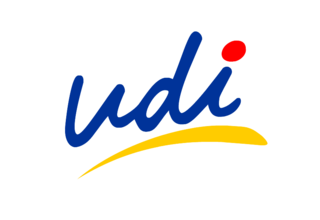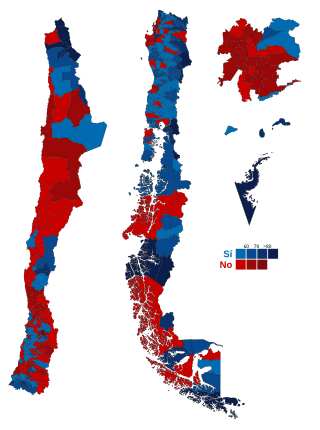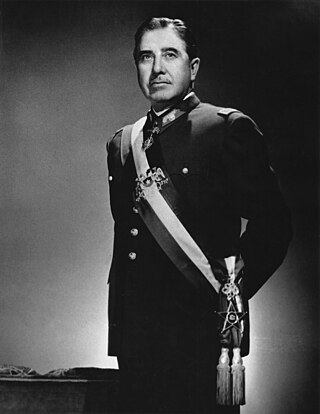Related Research Articles

The Christian Democratic Party is a Christian democratic political party in Chile. There have been three Christian Democrat presidents in the past, Eduardo Frei Ruiz-Tagle, Patricio Aylwin, and Eduardo Frei Montalva.

The Party for Democracy, also known as For Democracy is a centre-left political party in Chile. It states to stand in the traditions of liberal progressivism. It was founded in December 1987 by Ricardo Lagos, who aimed at forming a legal social-democratic party, as the Socialist Party of Chile (PS) remained illegal at the time. The PPD continued to function after the defeat of Pinochet. Until 1997, double membership of PPD and the PS was allowed.

The Socialist Party of Chile is a centre-left political party founded in 1933. Its historic leader was President of Chile Salvador Allende, who was deposed in a CIA-backed coup d'état by General Augusto Pinochet in 1973. The military junta immediately banned socialist, Marxist and other leftist political parties. Members of the Socialist party and other leftists were subject to violent suppression, including torture and murder, under the Pinochet dictatorship, and many went into exile. Twenty-seven years after the 1973 coup, Ricardo Lagos Escobar won the Presidency as the Socialist Party candidate in the 1999–2000 Chilean presidential election. Socialist Michelle Bachelet won the 2005–06 Chilean presidential election. She was the first female president of Chile and was succeeded by Sebastián Piñera in 2010. In the 2013 Chilean general election, she was again elected president, leaving office in 2018.

The Independent Democratic Union is a conservative and right-wing political party in Chile, founded in 1983. Its founder was the lawyer, politician and law professor Jaime Guzmán, a civilian allied with Augusto Pinochet. Guzmán was a senator from 1990 until his murder by terrorist communist guerrillas on April 1, 1991.
This article gives information on liberalism worldwide. It is an overview of parties that adhere to some form of liberalism and is therefore a list of liberal parties around the world.

National Renewal is a liberal conservative political party in Chile. It is a member of Chile Vamos, a center-right to right-wing coalition. Sebastián Piñera, the former President of Chile, is a member of the party.

The Radical Democracy, was a Chilean centre-right political party. The party, created in 1969, was dissolved in 1973, and reappeared in 1983 before disbanding permanently in 1990.

The 1988 Chilean national plebiscite was a presidential election in form, but not in name, as it was officially referred to as a national referendum. Held on October 5, 1988, the plebiscite aimed to determine if Augusto Pinochet, the head of a military dictatorship, should become president for eight years under resumed civilian rule. The "No" side won with 56% of the vote, marking the end of Pinochet's rule of 16 and a half years. Democratic elections were held in 1989, leading to the establishment of a new government in 1990.

The National Union Movement was a Chilean political party that supported the military dictatorship of General Augusto Pinochet, founded on 27 November 1983 by Andrés Allamand, Francisco Bulnes Sanfuentes, Pedro Ibáñez Ojeda and other former members and supporters of the National Party, the Radical Democracy and Christian Democrats expelled from the party. Many members of the National Union Movement occupied public offices and important positions during that regime. The referent defined itself as independent, conservative and liberal.

National Advance was a Chilean far-right political party of nationalist ideology who supported the military regime led by Augusto Pinochet. They had party legal existence between January 1988 and July 1991.
The Democratic Party of Chile was a Chilean political party that had legal existence from 1988 to 1989 under the state of "party in formation".

The Liberal Democrat Party of Chile was a Chilean political party that had legal existence from 1988 until 1989 under the state of "in formation".
The Republican Party or Republican Right —also known as Republican Democratic Right — was a Chilean centre-right political party existing from 1982 to 1987 during the military dictatorship of Augusto Pinochet.
The Liberal-Republican Union was a Chilean right-wing political party founded in December 1987 from the merger of the Liberal and Republican parties. Its president was Hugo Zepeda Barrios and its secretary general was Gabriel Leon Echaíz.

The Democratic Alliance was a Chilean political coalition existing between 1983 and 1988 that was composed of political parties and organisations that opposed the military regime led by Augusto Pinochet.
The National Democratic Agreement was a Chilean political coalition existing between 1984 and 1985 that brought together parties, movements and supporters of the military dictatorship led by Augusto Pinochet.

The People's Democratic Movement was a Chilean left-wing political coalition created on September 20, 1983 and dissolved on June 26, 1987. It was formed by the Communist Party of Chile, PS-Almeyda and the Revolutionary Left Movement (MIR), plus factions of the Christian Left and the Popular Unitary Action Movement (MAPU). Its first president was the socialist Manuel Almeyda.
The Republican Party is a right-wing populist and conservative political party in Chile. Its founder and current leader is Chilean presidential candidate José Antonio Kast. The Republican Party is one of two parties in the Christian Social Front coalition, along with the smaller Christian Conservative Party.

Pinochetism is a right-wing to far-right personalist political ideology based on the principles of semi-fascism, anti-communism, conservatism, authoritarianism, militarism, patriotism, nationalism, and neoliberalism. The ideology is inspired in Chilean dictator Augusto Pinochet, who headed the military dictatorship from 1973 to 1990. Former and current supporters of said dictatorship are known as pinochetistas.